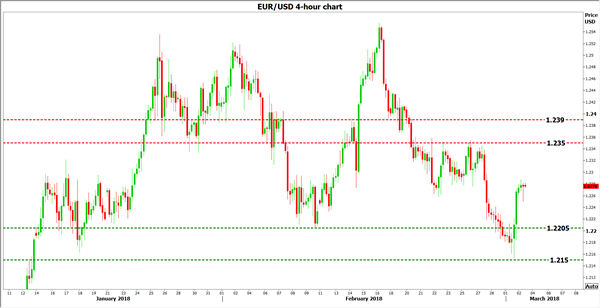The upcoming weekend promises to be an eventful one for European assets. On Sunday, while Italians head to the polls to elect their new leader, Germans will find out whether they have a new government, as the SPD party will announce if its members have approved another "grand coalition" with Merkel’s conservatives. The party’s decision could have wide-ranging effects for Germany’s political stability and by extent, for the common European currency.
Germany has been entangled in political coalition talks for several months now, ever since the election in September did not produce a clear winner. Chancellor Merkel, who’s party received the most votes in September but fell short of gaining a majority, has repeatedly rejected the prospect of forming a minority government, signaling that she is comfortable heading for early elections if coalition talks collapse. Her last realistic chance at forming a viable coalition is with the SPD party, her former coalition partners. Meanwhile, the SPD’s leadership shied away from agreeing to a partnership directly, and instead opted to put that decision to its members via a postal vote, with the results due to be published on Sunday.
Given the speed at which the euro gained during the early weeks of 2018, one would be forgiven to forget that Europe’s largest economy is facing a minor leadership crisis. To be fair, the euro’s surge was mostly associated with expectations that the ECB will begin scaling back its massive stimulus program soon, not politics. Still, whether or not Germany acquires a stable and pro-EU government could hold implications for the common currency, as well as European equities. In other words, the euro managed to rally despite looming political risks, and while the ECB’s actions may be the biggest driver for the currency, politics still play a significant role.
In case the SPD members finally approve the coalition offer, that would probably lift the cloud of political uncertainty currently hanging over Germany, and perhaps help the euro to resume its broader uptrend. Looking at euro/dollar, it could edge higher in this scenario and aim for a test of the 1.2350 territory, marked by the peaks of February 21, 22, and 26. If buyers manage to overcome that hurdle, the next area that may provide some resistance is 1.2390, identified by the lows of February 19.
A rejection by the SPD, on the other hand, is likely to exert downward pressure on the world’s most traded currency pair, as uncertainty heightens and the probability for early elections rises dramatically. An unstable political situation in Germany would also diminish the likelihood that a Franco-German partnership pushes forward with implementing the EU reforms that French President Macron has repeatedly called for over the past year. Euro/dollar may continue to correct lower and test the 1.2205 zone again, the February 9 low. A downward violation of that hurdle could set the stage for declines towards the pair’s latest lows, at 1.2150.

As for which is more likely, recent opinion polls generally point to SPD members approving the deal, but by a narrow majority. Considering that such polls carry a considerable margin of error though, and that polling has not been the most reliable predictor of major political events in recent years, it is debatable how much importance one should attach to these surveys.
Besides the German coalition outcome, price action in euro pairs is likely to be affected by how the election in Italy plays out as well. Moreover, the ECB is set to meet next week and thus, market attention may shift back to economics before too long, especially since the Bank is anticipated to tweak its policy language in a more hawkish direction at this gathering.
